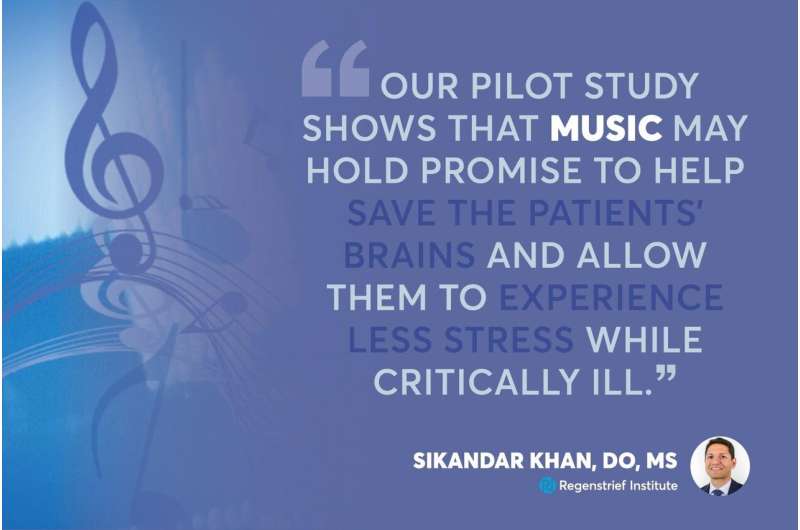Music shows promise in decreasing delirium in critically ill patients

It is common for critically ill patients on life support to develop delirium, a form of acute brain failure for which no effective treatment is known. A study from Indiana University School of Medicine and Regenstrief Institute researchers reports that music appears to decrease delirium in patients on mechanical ventilators in the intensive care unit (ICU).
In the study, critically ill individuals who listened to slow-tempo, relaxing music (60 to 80 beats per minute) had decreased need for sedatives, fewer days of delirium and were more awake—enabling them to receive physical therapy earlier. These results are encouraging and a larger clinical trial is currently underway.
Mechanically ventilated patients—more than a million adults annually in the United States—are at increased risk for delirium, which is associated with prolonged ICU stays, higher healthcare costs and increased mortality. The intubated patient experiences pain, anxiety and physiologic stress for which they usually are treated with drugs, which can contribute to delirium. This perpetuates a cycle of pain, anxiety, sedation and delirium.
"Like kidney or heart failure, individuals can develop brain failure, but there is no treatment equivalent to dialysis or the ventilator for brain failure, a condition which can adversely affect an individual's personality and quality of life for years," said Sikandar Khan, D.O., M.S., IU School of Medicine assistant professor of medicine and Regenstrief Institute research scientist, who led the new study. "Recent studies by our group and others have shown that drugs, including commonly prescribed antipsychotics, do not treat delirium or reduce its severity, so we desperately need a non-pharmacologic treatment. Our pilot study shows that music may hold promise to help save patients' brains and allow them to experience less stress while critically ill."
Existence of delirium and delirium severity were assessed twice daily in an Eskenazi Health medical-surgical ICU using the CAM-ICU-7, short for Confusion Assessment Method for the Intensive Care Unit 7, a tool developed by Regenstrief Institute and IU School of Medicine clinician-researchers.
Additionally, the new study is the first to determine the acceptability of music by patients on mechanical ventilators and the feasibility of administering music by non-specialists. Patients who listened to the slower-tempo, relaxing music two hours per day needed less sedation and had more delirium free days. ICU nurses could easily place noise-cancelling headphones and audio players with patients.
The researchers divided ICU patients on mechanical ventilators into three groups. Patients were randomized to (1) slow tempo playlists consisting of piano, guitar, Native American flute sounds and classical music; (2) patient preference for the selection of music (as conveyed by surrogates) or (3) an audio book. Patients in the audiobook arm of the study were further randomized to hear a reading of "Treasure Island," the Harry Potter series, or Dr. Seuss' "Oh the Places You'll Go!" All three audiobooks were chosen for readability, broad appeal, quality of narration and high ratings on commercial websites.
Eighty percent of the patients in the study rated the music enjoyable, duration appropriate and indicated that they liked receiving sessions twice a day. Patients noted music had made them feel more normal and calm as well as giving them a sense of control. Slow-tempo music, which had a significantly greater effect than music selected by patient preference, was also more highly favored by study participants.
By contrast, no matter which of the three books they heard while on the ventilator, patients rated audiobooks poorly, with lower acceptance than music of any type.
"Our work is novel in that we explored the effect of music on critically ill, mechanically ventilated adults age 18 and older, a very different group for whom music and delirium has not been previously studied," added Dr. Sikandar Khan. "It's the first study of its type based on science—in previous work on biomarkers we had shown that slow-tempo music yielded less stress hormones in blood—and science won."
"Decreasing Delirium through Music (DDM): A Randomized Pilot Trial," is published in the American Journal of Critical Care. Authors in addition to Dr. Sikandar Khan are Chenjia Xu, Ph.D.; Russell Purpura, M.D.; Sana Durrani, MBBS; Heidi Lindroth, Ph.D., R.N.; Sophia Wang, M.D.; Sujuan Gao, Ph.D.; Annie Heiderscheit, Ph.D.; Linda Chlan, Ph.D., R.N.; and Regenstrief Institute Research Scientists Malaz Boustani, M.D., MPH and Babar A. Khan, M.D., M.S. The work was supported by a Regenstrief Innovations award.
Dr. Babar Khan and Dr. Chlan are the primary investigators (PIs) and Dr. Sikandar Khan is an investigator of an ongoing randomized controlled clinical trial that is evaluating the effectiveness of exposure to slow-tempo classical music versus simple noise cancellation in decreasing delirium in older adults. The five-year project is supported by the National Institutes of Health's National Institute on Aging and National Eye Institute.
World Delirium Awareness Day is March 11, 2020.
More information: Sikandar H. Khan et al. Decreasing Delirium Through Music: A Randomized Pilot Trial, American Journal of Critical Care (2020). DOI: 10.4037/ajcc2020175


















